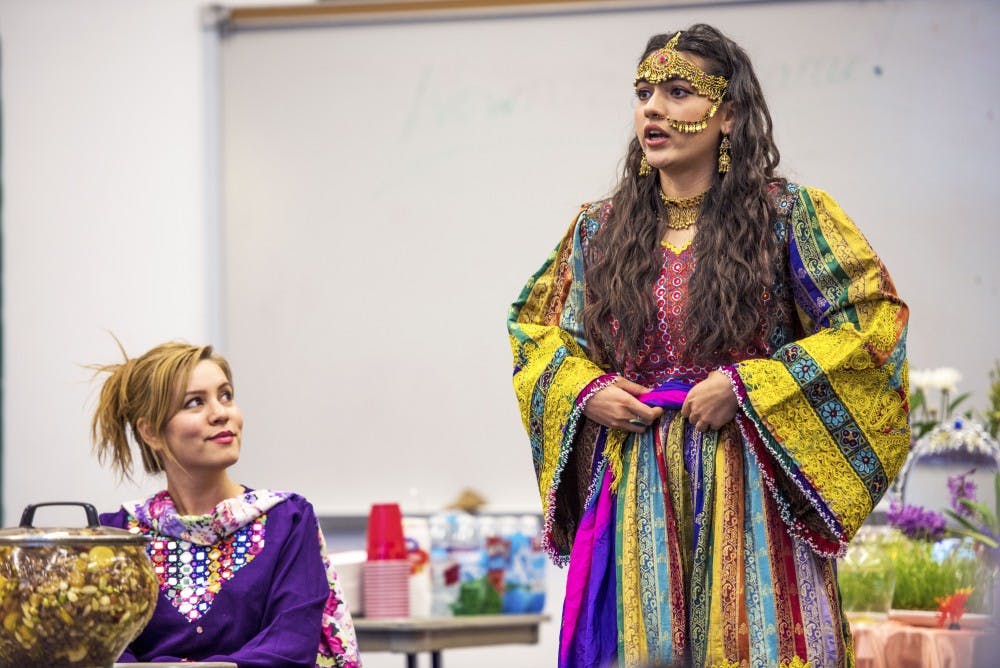After traveling across the globe in search of a home safer than the one they left behind, refugee and immigrant families coming to Albuquerque are being welcomed with open arms.
Brought to the University in 2006 by Associate Professor Jessica Goodkind, the Refugee Well-being Project pairs UNM students with a family that has emigrated to or sought asylum in Albuquerque within the past three years.
Refugee and immigrant families are recruited for the program through friends, current and past participants, employees of RWP and partner organizations.
Offered as a nine-credit course over two semesters, the program is designed as a “cultural exchange,” the goal of which is to allow all participants to learn from each other, and for students to assist families new to the United States to acclimate to American culture.
“For many refugees, the stresses they are facing during resettlement are equally or more difficult than the violence and persecution from which they had fled,” said RWP Research Coordinator Brandon Baca.
In order to participate, students must attend an orientation hosted by Goodkind, after which they will receive permission to register for the course.
The first 12 weeks of the course are classroom-oriented — students learn about the areas from which their refugees fled and why they left, what the families need the most help with, what specific difficulties they are facing and what resources are available to them.
When refugees and immigrants first arrive in the U.S. they are offered little help, Baca said. Student advocates at RWP try to change that.
“(The students) help them learn English, find jobs and access a variety of resources,” he said. “This helps reduce isolation and mental distress in refugees and builds on the strengths they bring.”
RWP advocate and UNM senior Olivia Martinez said she spends a lot of time keeping her families company. For them, she said, not speaking perfect English or living near other Afghan families makes creating a new life in the U.S. “lonely and difficult.”
“I do a lot of errands for them, going to the store, stuff like that,” she said. “It’s more small things but it adds up.”
Martinez said that in her time spent with families, she often finds herself talking, making food and even dancing.
Get content from The Daily Lobo delivered to your inbox
Martinez took on a partnership with a second family after a student dropped the course, postponing her graduation date.
While students are only required to spend six hours a week with their families, Martinez said she spends between 10 and 20 hours with her assigned families.
“It is a lot of time, but I do put this class first,” she said, adding that it is hard to watch her families experience misfortune.
“One of the families I work with, I was in the car with them and they got in a car accident,” she said. “It was really bad, and the car was totaled and it really like set us back, money-wise and transportation-wise and learning how to drive. And that’s really sad.”
Nazanin Shafie, a member of one of the families Martinez is partnered with, said in the 10 months she’s lived in the U.S, the biggest benefit is “the learning circles.”
Students and their families meet in these groups once a week for two hours, during which they share their culture with the group at large, participate in group discussions and spend the last hour one-on-one with each other to work on job applications, finding food and completing homework.
“I get to see most of the community (at the learning circles). I practice my English with my student, that’s very huge for me,” Shafie said. “Without this program my life would be much more difficult than this right now — I get to know more of the Afghan community and I get to be interacting with the American community that I am learning from.”
Also held at learning circles are cultural celebrations and birthdays. On Tuesday, the RWP celebrated the Afghan New Year, known as Nowruz.
Afghan families who participate in RWP came to the learning circle wearing traditional Afghan dresses, brought traditional Nowruz food and set up a table with objects used to celebrate.
“Many refugees are accustomed to welcoming newcomers into their homes and families,” Baca said. “But they often don’t receive the same welcome when they come to the U.S. Naturally, I think most people are curious to learn about one another but there is often a shortage of settings for this learning to occur.”
He said RWP provides a safe setting for cultural exchange, in which mutual understanding and admiration is “a natural outcome.”
“Welcoming refugees provides our community with the opportunity to learn about other parts of the world,” Baca said. “They are survivors of great adversity, and we have a lot to learn from them.”
As the students enter the second semester of the course, they begin to develop strong relationships with their refugee and immigrant families.
“Olivia goes with me to my doctor appointments or other appointments that I have,” Shafie said. “I am glad that I have her in my life and I hope in the future to be working with her more and learning from her.”
Martinez said if she were able to she would take the class again, and recommends it to all her friends who still have some time left at the University.
“Right away, it’s something that will change your life or change your course for your career,” she said. “It’s just so powerful. It’s just so meaningful.”
Celia Raney is a news reporter at the Daily Lobo. She can be contacted at news@dailylobo.com or on Twitter @Celia_Raney.






